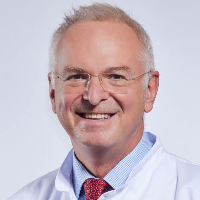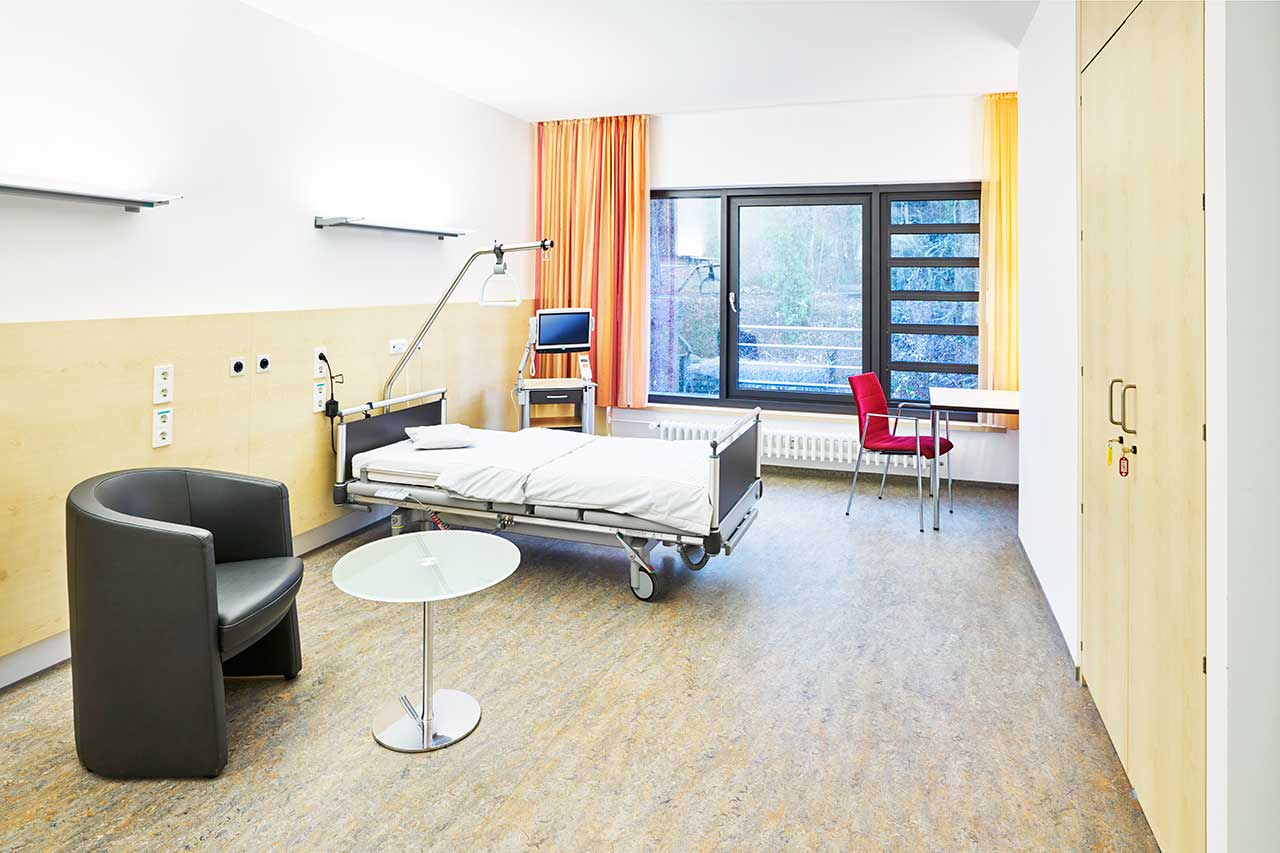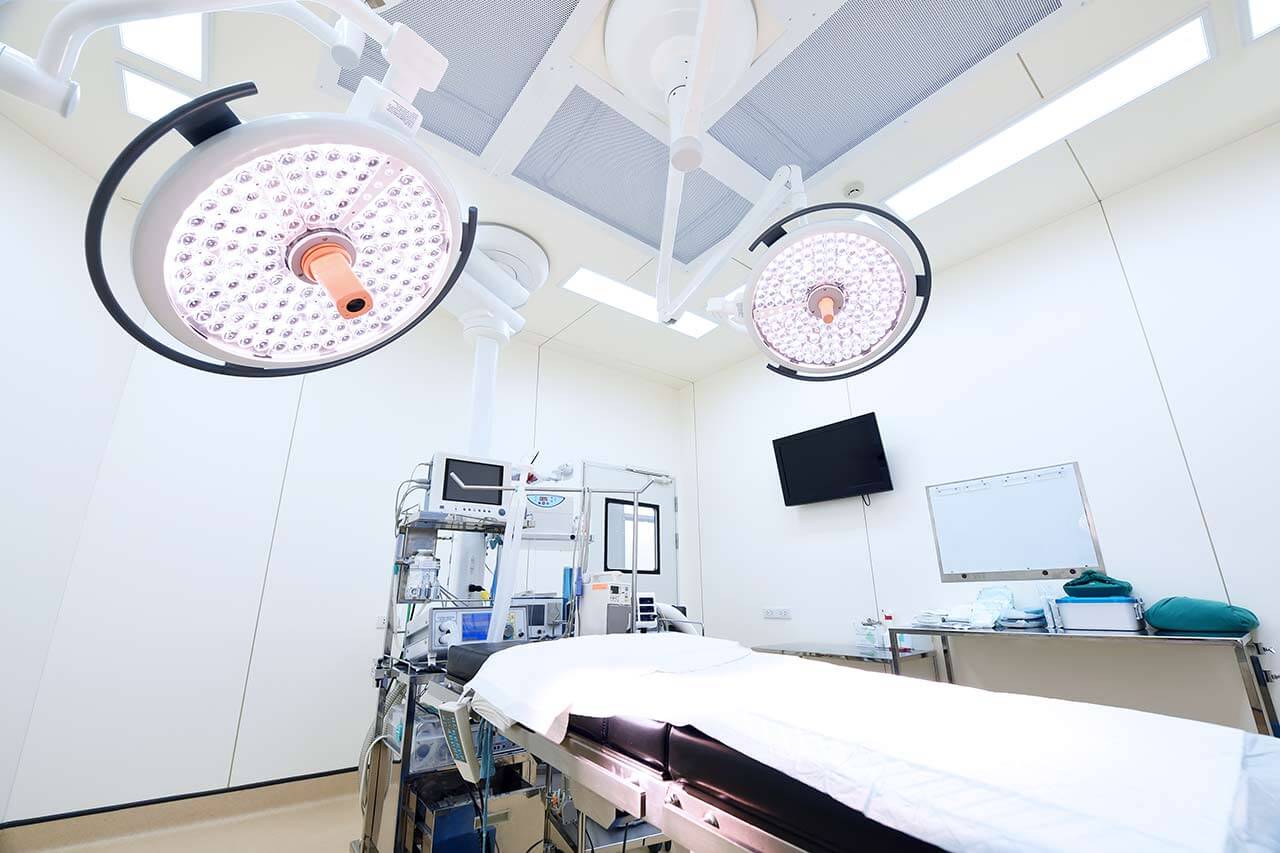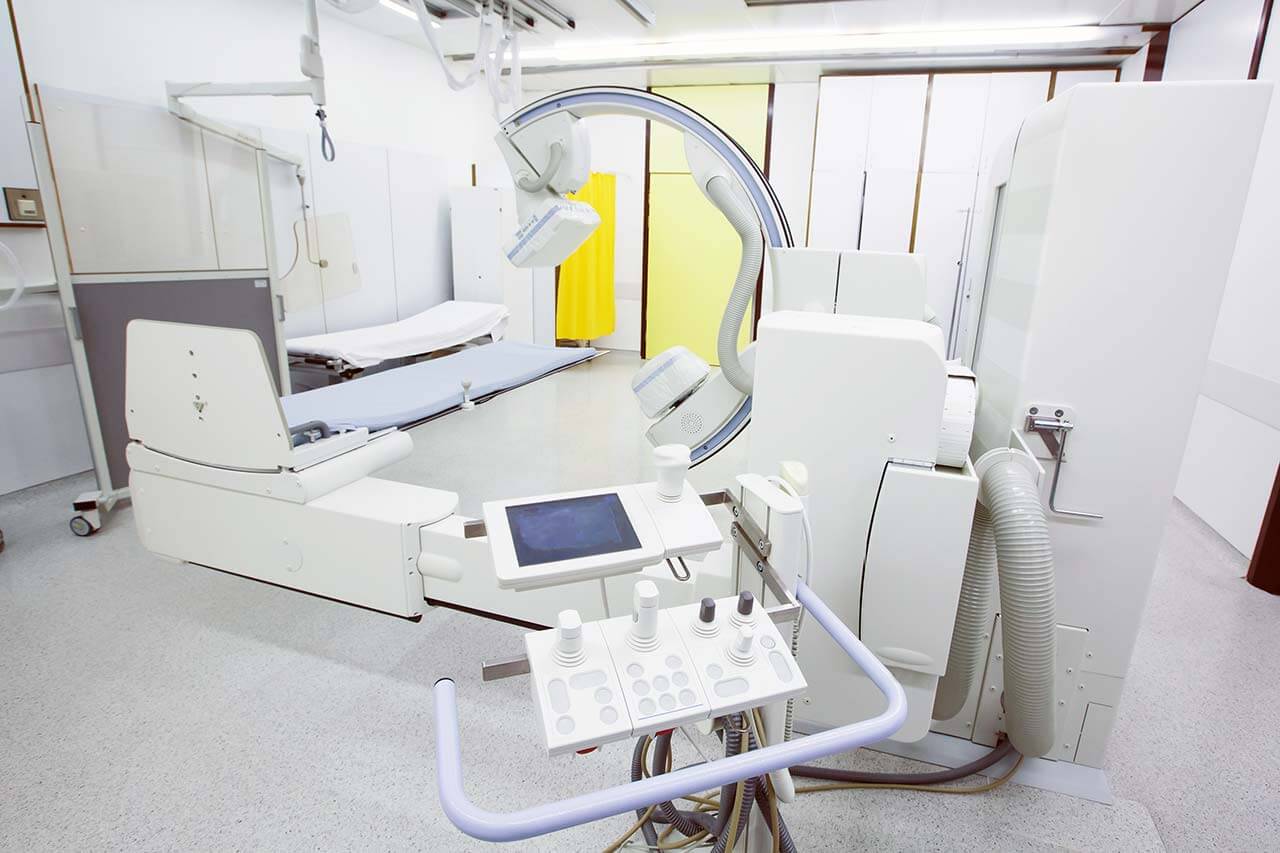
The program includes:
- Initial presentation in the clinic
- clinical history taking
- review of medical records
- physical examination
- laboratory tests:
- complete blood count
- biochemical blood test
- inflammation markers (CRP, ESR)
- blood coagulation analysis (aPTT, PT, INR)
- ultrasound of the abdomen
- gastroscopy
- nursing services
- consultation of related specialists
- treatment by chief physician and all leading experts
- explanation of individual treatment plan
Required documents
- Medical records
- Fibrogastroduodenoscopy (FGDS) (if available)
Service
You may also book:
 BookingHealth Price from:
BookingHealth Price from:
About the department
The Department of Gastroenterology, Hepatology, Endocrinology, Infectology and Nephrology at the Hospital Garmisch-Partenkirchen offers the full range of preventive, diagnostic and therapeutic services to the patients with diseases of the stomach, bowel, esophagus, pancreas, liver, gallbladder and biliary tract, kidneys, as well as pathologies of the thyroid gland, parathyroid glands, adrenal glands and diabetes mellitus. The department also provides medical care to the patients with infectious diseases, including gastrointestinal infections, soft tissue infections, and severe urinary tract infections. The department's diagnostic options include comprehensive laboratory diagnostics, abdominal ultrasound examinations, as well as imaging tests of the gastrointestinal tract and endoscopy. The department's specialists work with high-tech equipment, use both conventional and advanced therapeutic methods in their clinical practice, which provide patients with fast and effective treatment. The department is one of the best medical facilities of this kind in the national medical arena.
The Head Physician of the department is Prof. Dr. med. Hans-Dieter Allescher, who has gained an excellent reputation in the field of his competence in Germany. The specialist not only provides treatment to his patients, but also successfully participates in various research projects and has repeatedly trained in well-known hospitals in America. According to the Focus magazine, the specialist ranks among the best German doctors in the field of gastroenterology and endoscopic procedures for several years now!
Gastroenterology is an integral part of the department's clinical practice. The healthcare facility deals with the diagnostics and treatment of various diseases of the gastrointestinal tract, including cancers. The department's doctors have the very latest advances for ultrasound examinations, functional diagnostics (manometry, 24-hour pH metry, hydrogen breath tests) and endoscopic diagnostic procedures (gastroscopy, colonoscopy, esophagogastroduodenoscopy, capsule endoscopy, etc.). A specific complex of examinations is prescribed individually, based on the results of the patient's clinical examination, his complaints and medical history. This is followed by the development of an optimal treatment regimen, which may include both drug therapy and endoscopic interventions. In complex cases, when a surgical intervention is required (for example, in bowel or stomach cancers at their advanced stages), abdominal surgeons are involved in the therapeutic process. The department annually performs more than 7,000 diagnostic and therapeutic endoscopic interventions, so the patients can be sure of their flawless performance. In addition to classic types of endoscopy, such as gastroscopy and colonoscopy, the department also offers advanced endoscopic interventions, such as peroral endoscopic myotomy, anti-reflux mucosal ablation (ARMA), full-thickness mucosal resection using the FTRD system, endoscopic submucosal dissection, and others. All endoscopic interventions are carried out with a well-performed anesthesia, using state-of-the-art high-resolution equipment, which guarantees a high-quality result and the highest efficiency.
The department also admits patients with diseases of the liver, gallbladder and biliary tract. The doctors have been effectively treating cirrhosis, hepatitis, alcoholic liver lesions, liver diseases caused by toxic effects of drugs, benign and malignant liver tumors, cholecystitis, gallstone disease, biliary obstruction and other pathologies for many years. The patients with hepatological diseases are most often provided with high-quality drug treatment. The department's specialists use modern drugs with proven efficacy, give recommendations on lifestyle modifications, etc. In some cases, endoscopic therapeutic procedures can also be prescribed, for example, endoscopic retrograde cholangiopancreatography and cholangioscopy.
The department has an experienced team of infectologists who carry out the treatment of infectious diseases of the gastrointestinal tract, soft tissues and urinary tract. Of particular interest is the treatment of gastroenterological infections and inflammations: gastroenteritis, diverticular disease, pancreatitis, cholecystitis and cholangitis. Antibiotic therapy is the basis of treatment, and the physicians take a responsible approach to the choice of the drug, its dosage and the duration of therapy in order to prevent the development of antibiotic resistance.
Endocrinology is represented by a separate highly qualified team of doctors who provide medical care to the patients with diseases of the thyroid gland (hypothyroidism and hyperthyroidism), parathyroid glands (hypoparathyroidism and hyperparathyroidism), adrenal diseases (Conn's and Cushing's syndrome), as well as diabetes mellitus. In most cases, it is sufficient to carry out drug therapy with hormone medications. In the case of type 1 diabetes mellitus, the department's patients receive insulin therapy in the form of injections or using a special pump. An integral part of the treatment of diabetes mellitus is the proper diet, regular monitoring of blood glucose levels, and the cessation of bad habits.
The department's therapeutic offer is complemented by the treatment of a wide range of kidney diseases: acute and chronic kidney failure, kidney lesions due to systemic diseases, secondary arterial hypertension, cardiorenal and hepatorenal syndromes. The department's specialists also provide medical care for the patients after a kidney transplant surgery. All modern types of kidney examinations are available in the department, including special laboratory tests, ultrasound examinations, and a kidney biopsy. Treatment regimens for the patients with kidney disease may include drug therapy, renal replacement therapy, immunosuppressive therapy, and other treatment methods that are prescribed on an individual basis according to the diagnosis, the patient's general health condition, age, and other factors.
The department's diagnostic options include:
- Gastroenterology
- Laboratory tests
- Functional diagnostics
- Manometry
- 24-hour pH metry and pH impedancemetry
- Hydrogen breath tests for glucose, lactose, lactulose, fructose, sorbitol, Helicobacter pylori
- Endoscopic diagnostics
- Esophagogastroduodenoscopy
- Gastroscopy
- Colonoscopy
- Proctoscopy and rectoscopy
- Capsule endoscopy
- Balloon enteroscopy
- Endosonography
- Hepatology
- Laboratory tests
- Endoscopic diagnostics
- Endoscopic retrograde cholangiopancreatography
- Cholangioscopy
- Infectology
- Laboratory diagnostics
- Endocrinology
- Laboratory tests
- Ultrasound examinations
- Nephrology
- Laboratory tests
- Ultrasound examinations
- Kidney biopsy
- Other diagnostic methods
The department's range of therapeutic services includes:
- Gastroenterology
- Drug therapy
- Endoscopic interventional procedures
- Gastroscopy
- Colonoscopy
- Proctoscopy and rectoscopy
- Peroral endoscopic myotomy
- Anti-reflux mucosal ablation (ARMA)
- Full-thickness mucosal resection using the FTRD system
- Endoscopic submucosal dissection
- Percutaneous endoscopic gastrostomy
- Hepatology
- Drug therapy
- Endoscopic interventional procedures
- Endoscopic retrograde cholangiopancreatography
- Cholangioscopy
- Infectology
- Drug treatment with antibiotics
- Endocrinology
- Drug therapy with hormone medicines
- Insulin therapy, including insulin pump therapy, for the treatment of type 1 diabetes mellitus
- Nephrology
- Drug therapy
- Renal replacement therapy
- Hemodialysis
- Peritoneal dialysis: intermittent peritoneal dialysis and continuous ambulatory peritoneal dialysis
- Immunosuppressive therapy
- Other treatment methods
Curriculum vitae
Prof. Dr. med. Hans-Dieter Allescher holds the position of the Head Physician of the Department of Gastroenterology, Hepatology, Endocrinology, Infectology and Nephrology at the Hospital Garmisch-Partenkirchen. Since 2007, he is also the Medical Director of the Center for Internal Medicine at the Trauma Clinic Murnau. From August 1, 2013 to July 31, 2018, Prof. Allescher headed the Board of Medical Directors. Prior to his appointment as the Head Physician, he also worked as a Deputy Medical Director (2006 - 2013).
Clinical Practice and Additional Medical Qualifications
From 1985 to 1994, prior to his appointment as the Head of the Department of Gastroenterology, Hepatology, Endocrinology, Infectology and Nephrology at the Hospital Garmisch-Partenkirchen, the doctor was a Research Fellow, while from 1995 to 2002 he was a Senior Physician in the famous Department of Internal Medicine II at the University Hospital of Ludwig Maximilian University of Munich (under the direction of Prof. Dr. med. Dr.h.c. Meinhard Classen). From 1986 to 1988, he completed a research internship at McMaster University, Department of Physiology and Pharmacology, Hamilton, Canada. He repeatedly came as a Visiting Professor at Johns Hopkins University, Baltimore, Virginia Commonwealth University, Virginia, and the Mayo Clinic, Rochester, USA. He acted as a Tutor and Instructor in national and international courses on endoscopy several times. Between 1998 and 2002, he, together with Prof. Wessel and Prof. Feussner, temporarily headed the Working Group on Minimally Invasive Interdisciplinary Therapeutic Interventions (MITI) at the University Hospital Rechts der Isar Munich.
Medical Studies
From 1978 to 1980, Dr. Allescher completed his Preclinical Study of Medicine at the Regensburg University, and from 1980 to 1985, he completed his Clinical Training at the Technical University of Munich. In 1985, he received a medical license and in the same year he defended his doctoral thesis in Sports Medicine. In the same period of time, he became a scholar of the Bavarian Foundation for the Promotion of Gifted People (Bayerische Begabtenförderung) and a student of German Academic Scholarship Foundation (Studienstiftung des Deutschen Volkes). Then, in 1991, he had his board certification in Internal Medicine, and in 1993 he had his board certification in Gastroenterology. In the same year he had his habilitation, received his PD title and Venia Legendi at the Technical University of Munich. In 2000, he received his Extraordinary Professorship in Internal Medicine at the Technical University of Munich.
Research Focuses
Special research focuses include both fundamental and clinical research projects, in particular in the field of Neurogastroenterology, Diagnostic and Interventional Endoscopy.
- Neurogastroenterology. Prof. Allescher for many years headed the project, which was implemented with the support of the German Research Foundation. The research was devoted to the cellular and molecular-biological basis of the nervous regulation of the gastrointestinal tract. From 1995 to 2003, his research team was part of the Collaborative Research Centers SFB 391.
- Endoscopy. Prof. Allescher carried out many clinical and fundamental research projects in Interventional Endoscopy (gastroscopy, ERCP, endosonography), as well as in Functional Gastrointestinal Diagnostics. He was one of the initiators of the LEADER II ENDOTEL "Endoscopy Teleservice" Project (funded by the Federal State of Bavaria, Bayern-On-line II) and headed the Working Group on Invasive Interdisciplinary Therapeutic Interventions (MITI) at the University Hospital Rechts der Isar Munich.
Professional Medical Experience and Volunteer Activities
Prof. Allescher is a Scientific Member of several national and international specialized organizations. He was the European Representative on the Steering Committee of the International Motility Society, and in 2003 he was appointed as a Board Member of the German Society of Endoscopy and Imaging Techniques (DGEBV). In 2015, he was elected as the President of this society. In 2004, he became a Member of the Advisory Board of the Bavarian Society of Gastroenterology.
Prof. Allescher is an author of more than 200 scientific publications, a co-author of numerous works on gastroenterology, as well as a publisher and a co-publisher of several medical textbooks. He is a member of the editorial boards of many journals (Zeitschrift für Gastroenterologie, World J. of Gastroenterology, Gastroenterology, Endoskopie heute, Viszeralmedizin), as well as an active reviewer for more than 20 scientific journals. He is a member of the advisory board of the organizations Deutschen Gastroliga and Kompetenzteams Magengesundheit.
The doctor has won numerous awards for his scientific and academic achievements, for example, the Prize in the field of Gastroenterology of the Bavarian Society of Internal Medicine.
Memberships in Professional Societies
- German Society of Internal Medicine (DGIM).
- German Society for Gastroenterology, Digestive and Metabolic Diseases (DGVS).
- American Gastroenterological Association (AGA).
- European Society of Gastrointestinal Endoscopy (ESGE).
- Association of German Internists (BDI).
- German Cancer Society (DKG).
- Working Group on Internal Oncology (AIO).
- Working Group on Neurogastroenterology and Motility.
- European Motility Society (EMS).
- American Motility Society (AMS).
- International Motility Group (IMG).
- German Society of Ultrasound in Medicine (DEGUM).
- German Society for Dysphagia (DGD).
Photo of the doctor: (c) Klinikum Garmisch-Partenkirchen
About hospital
According to the well-known Focus magazine, the Hospital Garmisch-Partenkirchen ranks among the top medical facilities in Bavaria!
The hospital is a modern medical complex that combines a long history, glorious traditions and state of-the-art innovations. The hospital operates on the basis of Ludwig Maximilian University of Munich, and therefore it meets the strictest standards of university medicine, offering its patients the very latest scientific achievements and advanced treatment methods.
The hospital has 505 beds for inpatient medical care. A highly qualified and motivated medical team of more than 1,500 employees, as well as high-tech equipment, contribute to the excellent reputation of the hospital and high treatment success rates. The medical facility has 18 specialized departments for medical care provision. The hospital admits more than 23,000 inpatients and about 45,000 outpatients every year.
The medical facility is especially popular in knee and hip replacement surgery. The hospital has more than 50 years of experience in this medical field and ranks among the top five specialized healthcare facilities for arthroplasty in all of Germany. An important focus of work of the hospital is the provision of emergency medical care to injured climbers and skiers in a specialized Department of Traumatology and Sports Orthopedics. The injured people are delivered to the hospital by helicopter. The helipad is located directly on the territory of the hospital. The hospital's specialists also demonstrate excellent results in the treatment of gastrointestinal, liver and kidney diseases, as well as metabolic disorders.
Since 2004, the hospital has repeatedly been awarded the KTQ "Cooperation to improve the transparency and quality of medical services" quality certificate. This state certification is voluntary and is carried out every three years by a number of independent German expert institutions.
Despite the excellent equipment and the availability of advanced medical technologies, the focus of each hospital's employee is on the patient, a respectful attitude to him and customized medical care. The hospital offers a pleasant and friendly atmosphere in which the patient feels as comfortable as possible. In addition, the hospital is located in a beautiful mountainous area, so the forces of nature also contribute to the restoration of the health and peace of mind of patients.
Photo: (с) depositphotos
Accommodation in hospital
Patients rooms
The patients of the Hospital Garmisch-Partenkirchen live in comfortable single, double and triple rooms. All patient rooms have an ensuite bathroom with a shower and a toilet. The patient room furnishing also includes an automatically adjustable bed, a bedside table, a TV and a telephone.
If desired, the patient may stay in the enhanced comfort room, which corresponds to the level of a five-star hotel. Such patient rooms are equipped with a fridge and a safe for storing valuables. There is a 24-hour free TV, including Sky programs, Wi-Fi, etc. The design of the enhanced comfort patient rooms is carefully thought out and pleases the eye with a nice color scheme, furniture made from natural materials, and beautiful decor elements.
Meals and Menus
The patients of the hospital are offered tasty and varied three meals a day: buffet breakfast, lunch and dinner. If it is necessary to exclude certain foods from the diet due to the patient's health condition, he will be provided with an individual menu.
The patients who live in the enhanced comfort rooms are additionally offered a wide range of drinks, snacks and fruits (around the clock), as well as an exclusive "Schmankerl-Karte" menu. In addition, the kitchen staff will gladly accept all the special wishes of the patients and bring them to life.
Further details
Standard rooms include:
Accompanying person
Your accompanying person may stay with you in your patient room or at the hotel of your choice during the inpatient program.
Hotel
You may stay at the hotel of your choice during the outpatient program. Our managers will support you for selecting the best option.




